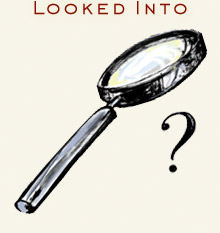Emdashes—Modern Times Between the Lines
The Basics:
About Emdashes | Email us
Ask the Librarians
Best of Emdashes: Hit Parade
A Web Comic: The Wavy Rule
Features & Columns:
Headline Shooter
On the Spot
Looked Into
Sempé Fi: Cover Art
New Yorker Editors Weren't Taken in By JT LeRoy
Filed under: Looked Into Tagged: books, Indians, JT LeRoy, memoirs, Native Americans, race

A reassuring aside in Simon Dumenco’s piece about how even he was taken in by a memulist (by now, there should be a single word for memoirist-fabulist):
LeRoy, who lived in San Francisco, had a way of insinuating himself into the lives of the writers, editors and celebrities in his ever-expanding circle, and before long he started calling me at odd hours in New York to engage me in endless therapy sessions (he was a wreck, for instance, when a story of his was rejected by The New Yorker). He was needy, nutty and fascinating.Meanwhile, here are two useful perspectives on the amorality and historical insult of Margaret Seltzer’s particular device, the “Native American” gambit. David Treuer in Slate:
But why pretend to be an Indian? What is so appealing about stripping off one’s own identity and donning a reddish one?… What non-Indians know about Indians does not come from the kinds of daily interactions that typically shape their understandings of people different from them…. There are many Indian writers with stories to tell that are ignored because they do not fit the preconceived notion of tragedy and cheap melodrama that make books like Love and Consequences so appealing.And commenter Kit Prate on a New York Sun story about memoirs and fact-checking; her comment is titled “How about an apology to the Indians???” and begins:
Since the concept of “it takes a village to raise a child” has been the heart of tribal culture (and well publicized at that) why were no red flags raised when this woman claimed to have been taken from her family? With one parent (supposedly) being a full-blood, and the practice of taking Indian children from their families coming to a screeching halt in the 50’s, how could two well-educated people — the agent and the editor — buy into this fantasy? (Especially when one of them, according to their bios, was an ex-reporter and a researcher.) Nobody asked what her tribal affiliation was?




Comments
Maybe if Seltzer had been more liberal in crediting her sources of inspiration she would have been covered. Enough already: Isn’t this acknowledgement thing sort of getting out of hand? Acknowledging one’s debt for certain turns of phrase? Were lawyers involved?